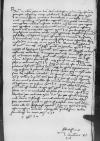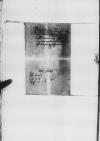Letter #4759
Tiedemann GIESE to Ioannes DANTISCUSFrauenburg (Frombork), 1538-05-03
| received [1538]-05-04 Manuscript sources:
| ||||
Text & apparatus & commentary Plain text Text & commentary Text & apparatus
Reverendissimo in Christo Patri et Domino, domino Ioanni Dei gratia episcopo Varmiensi, domino et maiori meo colendissimo plurimumque observando
Reverendissime in Christo Pater et Domine, domine colendissime plurimumque observande.
Promptam obsequiorum meorum exhibitionem.
Reddidit mihi frater Revendissimae Dominationis Vestrae mnemosynon amoris et benevolentiae in me vestrae, crucem auream aqualemque cum polubro argenteum, item pateram inauratam et non(!) instead of in⌈(!)(!) instead of in⌉gentas marcas nostrates. Reddidit autem homini non ingrato, verum agnoscenti mittentis benevolum animum et paternum affectum. Quoniam autem ex ante actis cognovi Reverendissimam Dominationem Vestram pro beneficiis quamvis amplissimis contemnere verba ampla gratiarum, hoc solum cupio certum ipsi haberi, non desituram umquam esse apud me memoriam beneficiorum et benevolentiae eius, quin omnibus studiis coner respondere illorum amplitudini et amori in me Reverendissimae Dominationis Vestrae.
Demandatam profectionem ad serenissimum
Sed fatis parendum est neque par est me non obsequi consiliis et voluntati Reverendissimae Dominationis Vestrae. Itaque ad
Hodie quae in
Apud dominum
Ego me Reverendissimae Dominationi Vestrae asservantissime commendo cupioque illam quam bellissime valere.
Eiusdem Reverendissimae Dominationis Vestrae addictissimus


 AAWO, AB, D.96, f. 96v
AAWO, AB, D.96, f. 96v